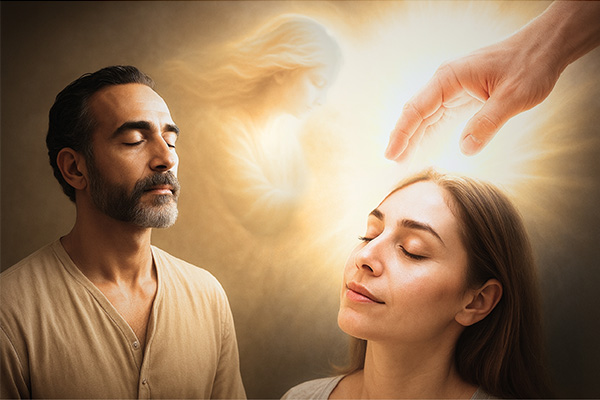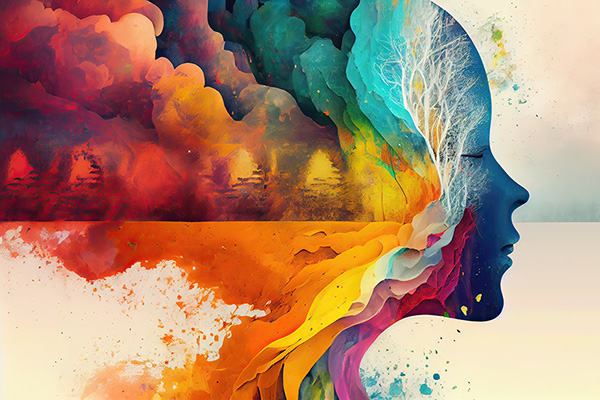remote healing
A Beginner’s Guide To Holistic Healing
 True healing is about more than just easing lower back pain or calming anxious thoughts. It’s about supporting the “whole you” so you can live in greater balance, joy and peace.
True healing is about more than just easing lower back pain or calming anxious thoughts. It’s about supporting the “whole you” so you can live in greater balance, joy and peace.
It means caring for the body, the heart, the mind, and the soul. While each of these areas can be worked on separately, the deepest transformation happens when they’re all supported together. That’s the essence of holistic healing.
For many people who are new to holistic healing, it can seem complex, mysterious, or even intimidating. Often, there’s curiosity, but also uncertainty about where to begin, especially if they’ve never tried it before.
Some worry they’re not knowledgeable enough, or believe it’s something only meant for people with special spiritual insight or advanced esoteric understanding. Others may wonder if they’ll “do something wrong” or fear they won’t understand what’s happening during a session.
These feelings are completely normal, but they can hold you back from exploring something that could be deeply supportive and life-changing.
The truth is, holistic healing doesn’t have to be complicated or overwhelming. You don’t need to know every technique or understand all the details to benefit from it. An experienced healer will help you find the best route, even if you’ve never walked the path before.
If you’ve never had a holistic healing session, here’s what often happens: You might arrive thinking you need one specific kind of support, but a skilled healer will take time to tune in and see what you truly need most. Sometimes they’ll use the method you requested, and other times they may suggest a different approach, or even combine several techniques, to support you in the best possible way. The aim isn’t just temporary relief; it’s to start you on a healing journey you can continue long after the session ends.
The Lesser-Known Art Of Trance Healing
 Many psychics and mediums are naturally drawn to healing and energy work. Many of us feel an innate pull toward alternative therapies, especially those that call upon the loving assistance of the spirit realm to heal the body, mind, and soul.
Many psychics and mediums are naturally drawn to healing and energy work. Many of us feel an innate pull toward alternative therapies, especially those that call upon the loving assistance of the spirit realm to heal the body, mind, and soul.
Whether we’re seeking healing for ourselves or exploring how other healers invite spirit intervention, the journey can be enlightening and transformative.
This interest in spirit-assisted healing became particularly strong for me recently when I visited a trance healer in Spain. He is a gifted medium and a highly respected healer, known both locally and in the United Kingdom.
There is something both grounding and ethereal about him, as though he walks the line between worlds with grace and strength. He has worked with spirit for most of his adult life. Even as a child, he had profound experiences with the unseen world.
As someone who works regularly with spirit in my own practice, I know how vital it is to tend to our physical, emotional, and spiritual well-being. He seems to understand this intuitively, and his healing touch addresses all of those aspects for me.
He practices trance healing. It’s different from the more traditional laying-on-of-hands and Reiki approaches. During our sessions, I feel intense waves of peace, warmth, and an almost electric tingling sensation, even though he never physically touches me. The energy flows through me with unmistakable potency, and it’s clear that something or someone from the spirit realm is orchestrating the experience.
The Miracle Gift Of Spiritual Healing
 I discovered that I had the spiritual gift of healing many years ago when I went to visit my father in the hospital. He was in great pain and something told me to gently touch the knee he had just had surgery on. It was not my intention to accomplish anything, just to comfort him. But then I saw his expression change from agonizing pain to instant relief. That to me was a miracle!
I discovered that I had the spiritual gift of healing many years ago when I went to visit my father in the hospital. He was in great pain and something told me to gently touch the knee he had just had surgery on. It was not my intention to accomplish anything, just to comfort him. But then I saw his expression change from agonizing pain to instant relief. That to me was a miracle!
The next great healing miracle happened when one of my twin daughters was ice skating when she was about 8 years old. I was watching the children enjoy the beautiful winter day when my daughter suddenly slipped and fell. I will never forget her painful scream. I knew immediately that this was really bad! By the time I got to her, others were helping her, but she would not stop screaming. Hearing her in such pain shot through my heart like a bullet.
When I got to her, I immediately saw the bone protruding through her skin. I put my hands over the fracture on her forearm and said, “It’s okay, it’s okay. Immediately she stopped crying and said, “Mommy, it doesn’t hurt anymore. I was stunned and so was everyone else.
I held her arm all the way to the hospital, and when we got there, they made me remove my hands. Again I had to listen to my daughter scream in pain and I felt helpless.
After they immobilized her arm, they let me see her. I touched the cast on her arm and immediately felt that it was not properly applied. Of course, they refused to listen to me at first, but I kept insisting that something was wrong. Finally, they agreed to take a second x-ray, which showed that my daughter’s arm was indeed not in the correct position. So she had to have it done again. One of the nurses asked me how I knew. I never answered.
Not Everyone Chooses The Path Of Healing
 You’ve probably heard the phrase “what they don’t know can’t hurt them.” Sometimes this is true, but there are also times when what people choose to ignore or disregard can cause real harm – not only to themselves, but also to those around them.
You’ve probably heard the phrase “what they don’t know can’t hurt them.” Sometimes this is true, but there are also times when what people choose to ignore or disregard can cause real harm – not only to themselves, but also to those around them.
For those of us with psychic or spiritual gifts, there’s an added complexity: the ability to sense the struggles of others, which leads to the question of when and how to help.
Intuitives, channelers and healers are very aware of the energy of others, even when we’re just going about our daily routines. Whether it’s a stranger in the grocery store or a friend across the room, we tend to sense when someone is struggling with grief, trauma or stress.
We may choose to quietly send them comforting or healing energy, hoping it will ease their pain, even if only for a moment, yet the urge to help can be very strong in these situations. And while reaching out and offering help can be very uplifting or rewarding for everyone involved, there are times when our attempts to help are met with resistance, or worse, denial.
It’s especially challenging to see someone we care about turn a blind eye to their own needs or pain, and even more so when our support is disregarded or unappreciated.
One of the hardest lessons I have had to learn in both my personal and professional life is that I can only help those who are willing to help themselves. The sad truth is that sometimes people choose not to act on information that could improve their lives or change their destiny. Instead, their negativity, anger, or fear allows the problem to fester or the behavior to grow, affecting not only themselves but also their loved ones. Over time, this denial creates a cycle of suffering that affects physical, mental and karmic health and well-being, sometimes for generations.
Exploring The Benefits Of Reiki Healing
 Reiki healing offers a variety of potential benefits for both your physical and mental well-being. Reiki teaches that when our life force is high, we feel happy, radiant and vital, and when it is low, we feel sick, drained and stressed.
Reiki healing offers a variety of potential benefits for both your physical and mental well-being. Reiki teaches that when our life force is high, we feel happy, radiant and vital, and when it is low, we feel sick, drained and stressed.
Reiki is a form of energy healing in which practitioners use their hands to channel life force energy to the recipient. This universal energy or life force flows through all living things and is called ki in Japanese. The concept is similar to qi (or chi) in Chinese culture and prana in Indian culture.
A qualified Reiki healer is trained to channel healing energy to balance the flow of your life force energy and return you to a state of harmony and vitality.
Reiki has grown in popularity in recent years. Once viewed with skepticism by mainstream medicine, there’s a growing openness to complementary therapies, and Reiki is seen as a gentle and relaxing practice.
In today’s fast-paced world, stress is a major concern. Reiki’s reputation for promoting relaxation and reducing stress makes it attractive to many. Celebrities like Angelina Jolie, Nicole Kidman, Sandra Bullock and Gwyneth Paltrow and any mothers have spoken openly about their use of Reiki, giving it a touch of glamour and social validation.
Interesting Facts You May Not Know About Reiki
 People all over the world are turning to Reiki for its healing power, and it is now even being used in the medical field as a complementary therapy for the treatment of physical, emotional and mental illnesses.
People all over the world are turning to Reiki for its healing power, and it is now even being used in the medical field as a complementary therapy for the treatment of physical, emotional and mental illnesses.
Reiki is a spiritual philosophy and energy healing practice that was developed in Japan in the early 20th century by founder Mikao Usui.
Usui was a Tendai Buddhist whose lifelong quest for spiritual knowledge and healing techniques took him on a journey through many religious and spiritual traditions, including Shintoism, Buddhism, and Christian teachings, as well as the study of martial arts.
The most pivotal moment in Usui’s life occurred on Mount Kurama, a sacred mountain north of Kyoto. After 21 days of fasting and meditation, Usui had a profound spiritual experience of enlightenment that gave him the knowledge and ability to channel healing energy.
This experience led to the development of a healing system he called “Reiki,” which means “universal life energy” or “spiritual energy.” It’s based on the wisdom that “universal energy” can be channeled to support the body’s natural healing processes. Reiki is an extremely powerful energy, yet a remarkably gentle form of healing.
The Modern Practice Of Spiritual Healing
 In a world driven by science and technology, the value of our spiritual health is rarely recognized or appreciated these days, yet it is an essential aspect of our holistic health and well-being.
In a world driven by science and technology, the value of our spiritual health is rarely recognized or appreciated these days, yet it is an essential aspect of our holistic health and well-being.
The truth is that spiritual healing has been practiced since the beginning of time to promote physical, emotional, mental and spiritual well-being. Our ancestors were much wiser in this regard. They had a holistic view of health and wellness that not only focused on the physical and mental, but also honored the spiritual or metaphysical aspects of our existence.
In ancient Egypt, for example, illness was treated as a battle between good and evil, and magical remedies were used in addition to herbal medicines. In ancient Greece, holism underpinned everything, and the soul, mind, and body were considered one.
In Traditional Chinese Medicine, a holistic system practiced for at least 23 centuries, healing is achieved by balancing the yin-yang life force energies that permeate everything in the universe. In the indigenous healing traditions of Native America, holistic health is represented by the four quadrants of the ‘medicine wheel’ or ‘sacred circle,’ namely the physical, emotional, mental, and spiritual states of being.
In Christianity, spiritual healing is documented with many references to the healing power of faith and prayer. The Bible also refers to the spiritual gift of healing, and there are several accounts of Jesus performing miraculous healings. In Hinduism, Ayurveda is a five-thousand-year-old Vedic system of medicine that seeks to restore the balance between the body, mind, and spirit.